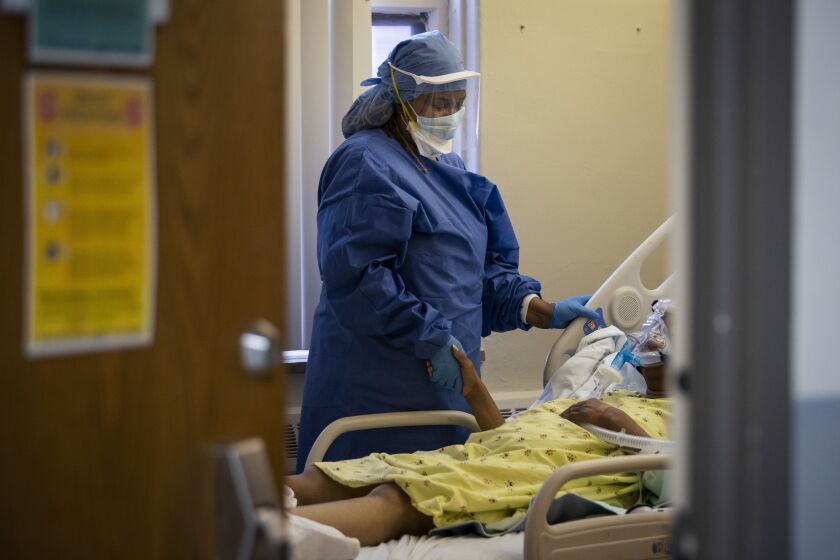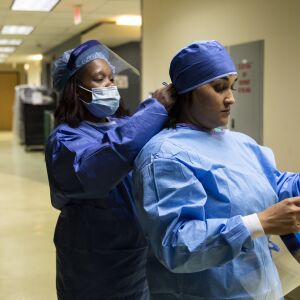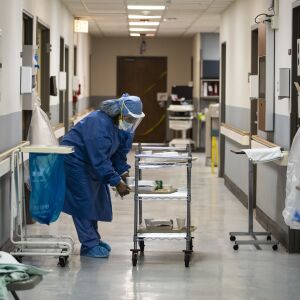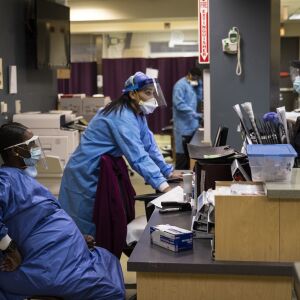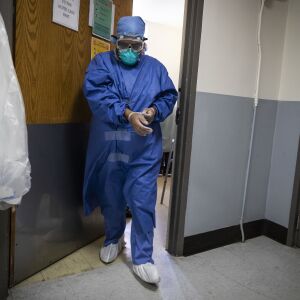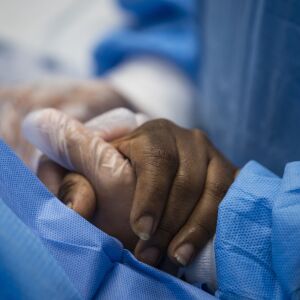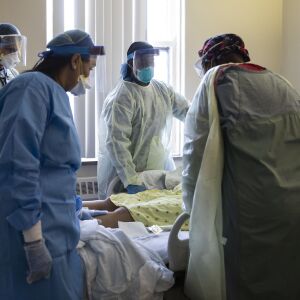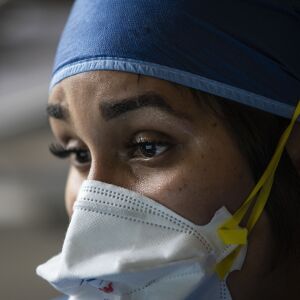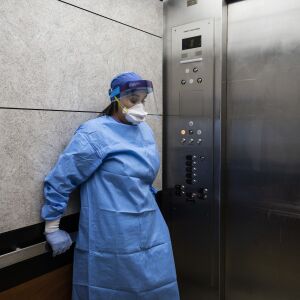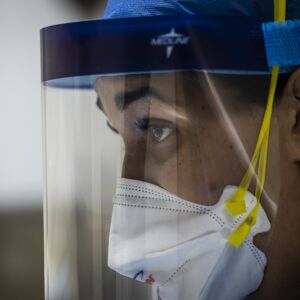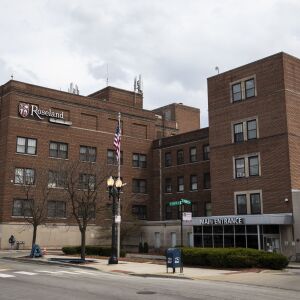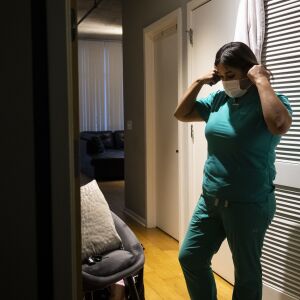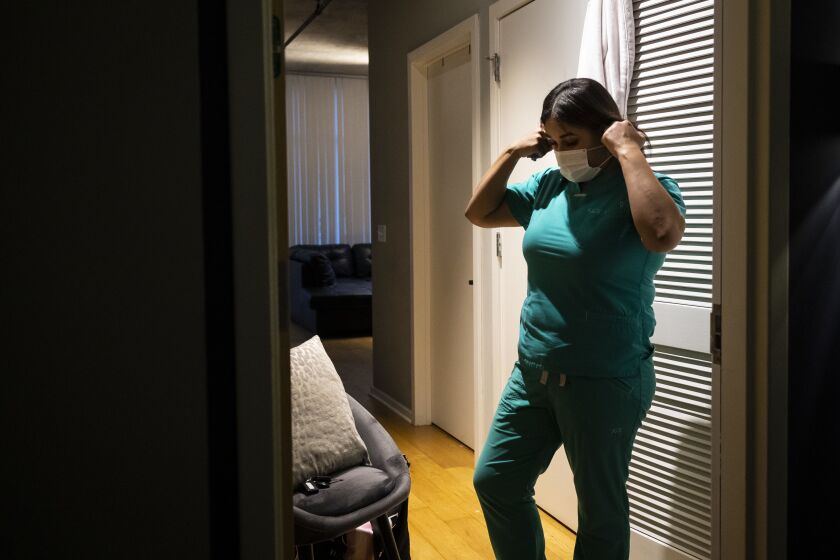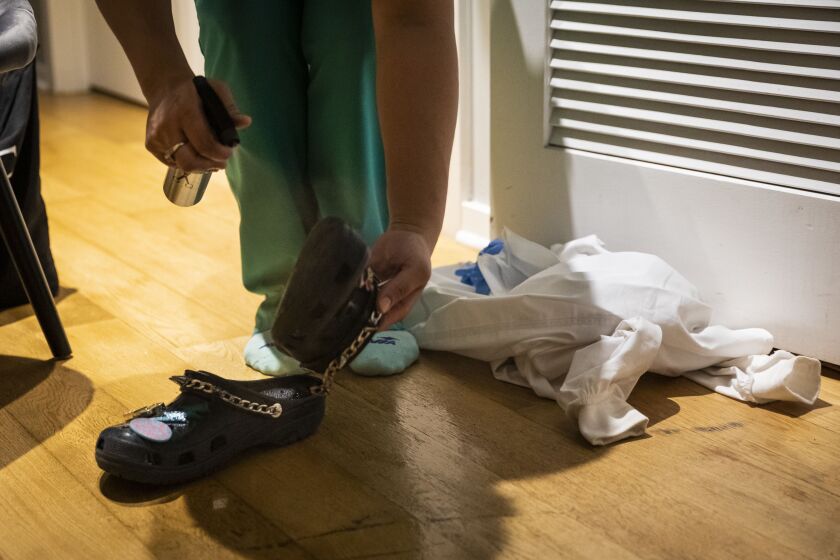Capri Reese can’t go home. Not unless she finds someone to step into her shoes.
“All of a sudden we’re down five staff in one day,” said the 12-year veteran nurse at Roseland Community Hospital, who Tuesday had to track down coworkers on their day off and get them to the hospital, in addition to all her usual duties.
“I see patients, treat patients, respond to codes, rapid response, intubate, order tests, write prescriptions,” Reese said. “All of those things, and I’m also covering for the CNO — the chief nursing officer.”
Five holes in a 14-person staff, including someone to do her job after her 12-hour shift. Those are very big charm-studded Crocs to fill.
“It’s a juggling thing, like a rolling puzzle, every day,” she said. “People who don’t usually call off are calling off.”
Why? Exhaustion, stress, ailments like the ordinary flu, plus absences related to COVID-19 — battling it themselves, caring for a relation who is, or watching their children because daycare centers are closed.
Against those obstacles, Reese has only her considerable charm.
“Strap that S on your chest and come in,” Reese said over the phone to a triage tech.
He agreed.
“I won the lottery!” exuded Reese. ”He’s totally coming in on his day off. Everybody is really stepping up.”
She worked the schedule in Roseland’s “brain box,” the cluttered office where staffing is managed. But a code blue alarm — there will be five during her shift — had her jumping to her feet. She ran — not walked fast, not trotted, but full-out sprinted — down the hall, phone still pressed to her ear, talking to one of the staffing agencies the hospital has turned to, trying to keep warm bodies in scrubs to treat the bodies in beds.

Nurse practitioner Capri Reese (left) checks the monitor for a heart rhythm while respiratory therapist Khafran Alshahin performs chest compressions on an 80-year-old man suffering from COVID-19. Respiratory therapists Dennis Kelly and Malcolm Love (right), also look at the monitor. The 80-year-old man was one of three patients to die of the coronavirus Tuesday at Roseland Community Hospital.
Ashlee Rezin/Sun-Times file
The problem with staffing agencies, she said, is that other war zones, like New York, are paying top dollar, and her nurses are taking it.
“Their husband may be out of work, and they tell me, ‘It’s not so much I don’t love Roseland, but they’re offering me more money and we’re down an income,’” Reese said.
‘Like playing dodgeball’
Once in the emergency department, she jams the phone in a pocket; staffing concerns are forgotten in the rainstorm of immediate problems, big and small.
A patient has wandered away from his room and doesn’t know where he belongs.
“Capri, handle this,” said a doctor, shrugging away the situation.
The ER is low on protective gowns; Reese rushes to the stock room.
“It’s like playing dodgeball,” she said. Like dodgeball, there is much starting and stopping. It seems she will greet everyone in her line of sight by name and can’t take five steps without someone asking her something.
“People are comfortable asking me,” said Reese, who keeps asking passersby, “Can you work until 11? Can you work until 11?”
“I need you,” she said, again and again. “I need you.”
Others, she’ll merely buck up, asking how they are. Not wanting to hug — a more important part of hospital work than outsiders might realize — they’ve developed an elaborate code of bows, foot taps, even the occasional curtsy.
“The nursing staff is under enormous stress,” Reese said.
‘It’s hitting home’
This all happened so fast. Six weeks. The first person with COVID-19 came into Roseland, on West 111th Street on the Far South Side, on March 15.
“Every day since then,” Reese said. “It isn’t some virus overseas. It’s home; it’s hitting home. It became so real. Pandemonium. People coming in, while information and standards change day to day. While we’re trying to get creative, expand to deal with the volume of patients. It’s overwhelming.”
Unless it’s not. The COVID unit can be silent. Scary quiet. Reese misses the presence of visitors, banished because of the fear of infection. Visitors are a vital line of defense in the health care chain.
“Normally patients have a visitor, sitting with their mom, letting you know their needs. Those are the assessments we are really missing out on. All the history, what’s going on with their mother, their father. Real time information. Everybody being isolated, it’s really hard to manage all of it, being one nurse.”
The deathly silence in the COVID-19 ward is broken by alarms, screams, cries for help. Reese joined knots of staffers, crammed into Roseland’s tiny rooms, responding to five code blues — hospital jargon for when a patient’s heart stops beating — and two rapid responses. Three patients died during her Tuesday shift, all of COVID-19.
“It was our worst day,” said Reese.
The stress of losing patients, of keeping gravely ill patients alive, of being family to the dying, bursts out sometimes. A patient gasped for air, but kept tearing off her BiPAP mask.
“Help me! Help me!” she cried.
“Patients have so much anxiety, even a little shortness of breath causes them to go into a panic,” said Reese.
One nurse wanted to restrain the struggling patient so she’d keep wearing the BiPAP, a pressurized breathing device. Another nurse argued that restraining the patient is wrong.
“No, we’re not doing that!” she said, adding that the patient was not a criminal.
The argument quickly grew heated, with swearing and shouting.
“Talk to me when you go to college for another four years!” snapped the senior nurse. “Until then, you don’t tell me what to do!”
One nurse stormed out and took a walk to calm down. The senior nurse stayed; the patient eventually was coaxed back into the mask.
Reese herself is not immune to the pressure. Last week, with no visitors allowed, a nurse held a cell phone so a dying woman’s daughter could say goodbye to her mother, apologizing for not being the child she should have been. Then the nurse handed the phone to Reese, to flee the room, weeping. When she returned, Reese handed the phone back to her and left the room; she had to cry, too.
“We never had the chance to talk about it,” said Reese, of the second nurse. “We had another rapid response.”
At home, a game face
Reese, who grew up in the Roseland community, misses having a life outside the hospital. Her family certainly misses her.
“It’s been a while, because of the coronavirus,” said her mother, Chrystle Lee, a breast cancer survivor. “I’m like, ‘Oh, come on over. You’ve got the mask on.’ And she says, ‘You don’t understand, you’re high risk. Your immune system is down. I can’t come over there.’”
There was a trace of criticism as she imitated her daughter’s refusal. Then Lee softens.
“She’ll order me food, from Uber Eats. I don’t even have to ask. It’s just there. We have a good family.”
The difficulties of getting the message to her mother is something Capri Reese sees throughout the community.
“When this disease first broke out, everybody thought that for some reason that this was not a disease for African Americans,” she said. “That it didn’t affect us. It’s actually the opposite. We’re getting that message out there, where my family lives. If people are infected and are shopping, we’re all exposed.”
At 7 p.m. Reese indeed was able to go home after 12 hours on duty. “I got two people to come in, three to stay later,” she said. “I’m still short.”
Her own family — a 15-year-old daughter, unhappy about not going to school, and Reese’s 18-year-old younger brother — live in a South Loop apartment.
At home, Reese immediately stripped off her lab coat and cleaned her shoes with antibacterial spray. Still wearing a mask, she took off her aqua scrubs and put them directly into the washing machine; the machine, and a shower, are conveniently near the door.
She stepped into the shower — some alone time, to assemble her game face.
“It’s scary,” she said. “I am, to be honest, scared. I have broken down, several times. But if you know me, I’m a ‘There’s-no-crying-in-baseball’ kind of person. I have to keep a strong face in front of my family.”
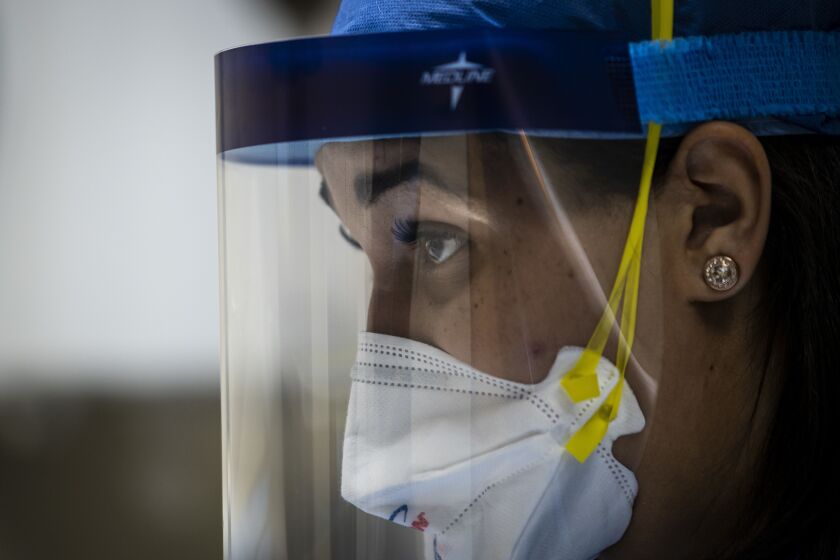
Nurse practitioner Capri Reese talks to a patient while a doctor administers an IV at Roseland Community Hospital on the Far South Side on Tuesday afternoon. During her standard 12-hour shift that day, she responded to five code blues and three patients suffering from COVID-19 died.
Ashlee Rezin Garcia/Sun-Times

